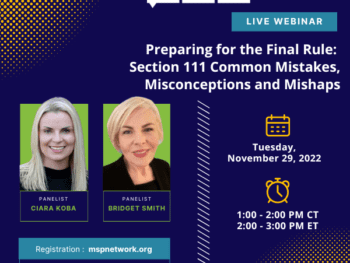
Click Link to Access Free PDF Download
“8 ‘Think Outside the Box’ Tactics to Settle Workers’ Comp Claims”
Trap #1: Avoid Overreporting a Claim
The rise of mandatory insurer reporting requirements under Section 111 has made claim management team members over-report their claims to Medicare. While there needs to be an increased sensitivity to the issue with expected rulemaking regarding “good faith” reporting and penalties under this process, everyone should take a step back and stop over-reporting. Examples of this include:
- Reporting on whole portions of the employee’s body and not the specific injury. Common over-reporting errors come from injuries to the employee’s spine. Instead of reporting a whole area such as the lumbar, thoracic, or cervical spine, ensure precision in your reporting by only specifying the specific level – g., L5-S1, C4-5, T-11-12;
- When there is doubt regarding the specific injury, communicate with the employee’s attorney regarding what injuries they are claiming; and
- Distinguish what body parts/injuries are admitted and what is denied in the claim management system. Make sure this is separated, as this can also mean the difference between allocating for something in a Medicare Set-aside allocation.
Proactive claim handlers and defense attorneys should also clarify these issues in the settlement agreement. An example could include:
************************************
The parties hereto agree that for purposes of the MMSEA, the following injuries are accepted as arising out of and related to the claim:
| ICD Injury Code # | ICD Code Description |
| G89.4 | Chronic pain syndrome |
| M47.817 | Spondylosis without myelopathy or radiculopathy, lumbosacral region |
| M96.1 | Postlaminectomy syndrome, not elsewhere classified |
| N31.8 | Other neuromuscular dysfunction of bladder |
| Z79.891 | Long term (current) use of opiate analgesic |
************************************
Trap #2: Understanding Correspondence from Medicare
The Centers for Medicare and Medicaid Services (CMS or Medicare) generates correspondence that is often confusion regarding their interests. Common letters that are sent include:
- Rights and Responsibilities letters;
- Conditional Payment Letters;
- Conditional Payment Notices; and
- Final Demand Letters.
When receiving letters from Medicare, it is essential to read them and understand what is asked. Never assume it is the “same old letter” and file it away without reading it. Paying attention to details is critical. It is also important to share this letter with the employee’s attorney and defense counsel. Never assume they received it even if their name is listed as a “cc.”
It is also essential to coordinate a response. Problems arise when parties assume a case is settled and report it. This triggers the repayment of conditional payments. An unaccredited response can result in headaches and delays beyond charging interest and referral to the U.S. Department of Treasury for collections.
Trap #3: Perfecting Conditional Payment Appeals and Medicare Advantage Plans
The courts have been clear that conditional payments must be repaid in full absent Medicare approving a compromise or waiver. When one seeks to appeal a conditional payment issue or deal in the area of having the amount reduced, it is essential to consider well-settled standards and case law:
- Compromise of conditional payments follows the standard outlined in 31 U.S.C. §3711. This can be used successfully only when the cost of the collection does not justify action based on the amount of the claim, the beneficiary is unable to pay, or successful litigation is questionable. See MSP Manual, §50.7.2; and Hadden v. U.S., 661 F.3d 298 (6th 2011);
- Waiver of conditional payments follows the standards outlined in the same statute. To be successful, one must demonstrate collection would “defeat the purposes” of the Social Security Act – financial hardship. It must also demonstrate that recovery would be against equity and good conscience. See MSP Manual §50.6.5.2
- It is well-established that one must follow the basics of administrative law process and procedure when challenging conditional payments. Following all steps in the process is compulsory. Taransky v. Sebelius, 956 F. Supp. 2d 563 (Dist. NJ 2013).
- Medicare Advantage Plans have the same rights of recovery as Medicare Parts A and B. The same administrative process must also be followed without variance. In re Avandia Mktg., 685 F.3d 353 (3rd 2012), Humana v. Western Heritage Insurance Co., 94 F. Supp. 3d 1285 (S. D. Fla. 2015), aff’d, 832 F.3d 1229 (11th Cir. 2016), and Potts v. The Rawlings Co., LLC, 11 Civ. 9071 (S. Dist. NY 2012).
Claim handlers should consult with their defense counsel if they have questions regarding the applicable law and procedures.
Conclusions
There are plenty of tips for every trap in Medicare Secondary Payer compliance. When using these tips, handlers can become more proficient in their position and better understand the law. It will also result in better practice and procedures to ensure the effective resolution of their claims.
 Author Michael Stack, CEO Amaxx LLC. He is an expert in workers’ compensation cost containment systems and helps employers reduce their workers’ comp costs by 20% to 50%. He works as a consultant to large and mid-market clients, is a co-author of Your Ultimate Guide To Mastering Workers Comp Costs, a comprehensive step-by-step manual of cost containment strategies based on hands-on field experience, and is the founder & lead trainer of Amaxx Workers’ Comp Training Center, which offers the Certified Master of Workers’ Compensation national designation.
Author Michael Stack, CEO Amaxx LLC. He is an expert in workers’ compensation cost containment systems and helps employers reduce their workers’ comp costs by 20% to 50%. He works as a consultant to large and mid-market clients, is a co-author of Your Ultimate Guide To Mastering Workers Comp Costs, a comprehensive step-by-step manual of cost containment strategies based on hands-on field experience, and is the founder & lead trainer of Amaxx Workers’ Comp Training Center, which offers the Certified Master of Workers’ Compensation national designation.
Contact: mstack@reduceyourworkerscomp.com.
Workers’ Comp Roundup Blog: http://blog.reduceyourworkerscomp.com/
©2022 Amaxx LLC. All rights reserved under International Copyright Law.
Do not use this information without independent verification. All state laws vary. You should consult with your insurance broker, attorney, or qualified professional.


























